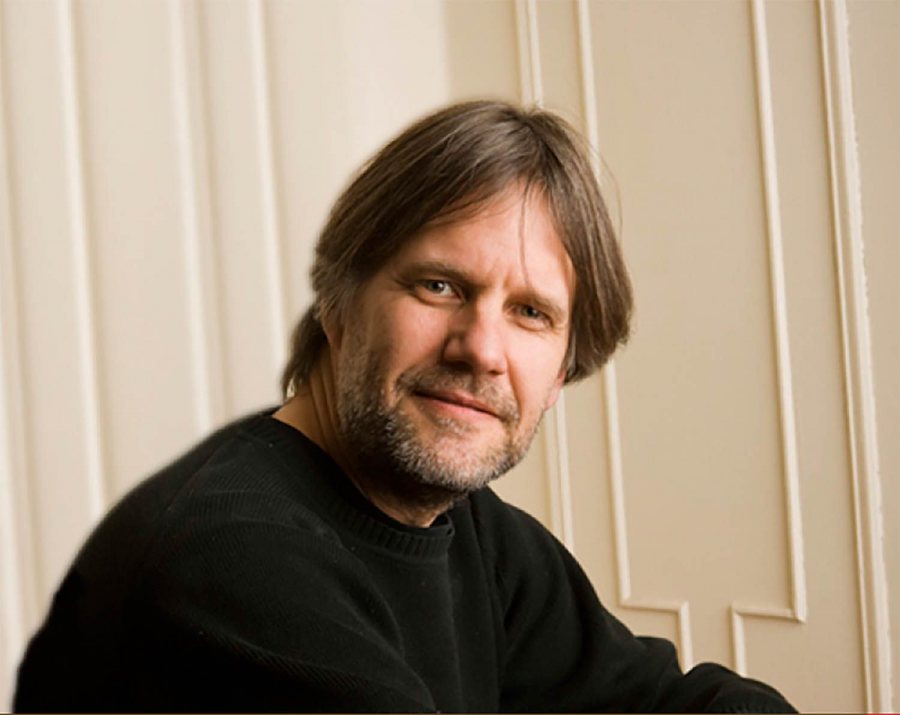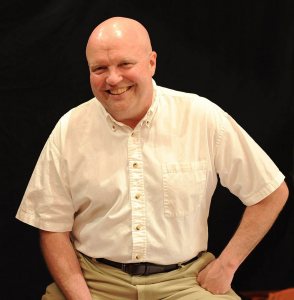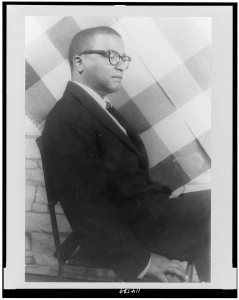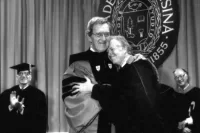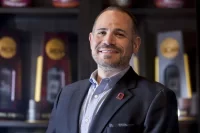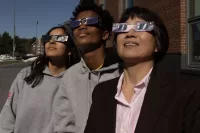
Where poems meet music, you’ll find visiting artist Frank Carlberg
“Setting poetry to music is an age-old tradition,” says jazz pianist and composer Frank Carlberg — but this approach to songmaking is not widespread in jazz.
Carlberg, a musician prominent on the New York City scene and a visiting artist at Bates this academic year, has done plenty to redress that balance. He estimates that he has composed around 200 jazz settings for poems — representing writers such as Anna Akhmatova, Wallace Stevens, Jack Kerouac, Kenneth Rexroth, and Robert Creeley — and nine of the 17 recordings on which he has served as bandleader feature such settings.
Last December, for example, in a Bates concert titled Word Circus that featured singer Christine Correa, Carlberg presented his music for poems by contemporary American writers Ron Padgett, Anselm Berrigan and others.
Having set the stage at Bates, so to speak, for this compositional mode, on March 3 Carlberg welcomes to the Olin Arts Center Concert Hall another composer known for poetry-based jazz: Steve Grover, a musician and teacher (at Bates, among other institutions) who was born in Lewiston and has made his career in Maine, but whose reputation stretches far beyond the border.
Established as a drummer by the late 1970s, Grover broke into composition with Blackbird Suite, which is based on a poem by Wallace Stevens and remains one of Grover’s signature achievements.
Supported by a band including Carlberg and Correa, Grover presents The Monk Variations, a long-form setting for poems written by Anthony Walton about the great jazz pianist Thelonious Monk. Walton, a writer in residence at Bowdoin College, will read from his work to begin the show.
That concert begins at 8:30 p.m. — relatively late by Olin Concert Hall standards. And that’s because there’s a whole other Carlberg-produced concert just prior to the Grover event, a 90-minute student performance, billed as a Music Salon, that honors two more big figures in jazz: Billy Strayhorn and Kenny Wheeler.
Strayhorn, of course, was key to the music of Duke Ellington as the composer (if not always credited as such) of such Ellington touchstones as “Lush Life,” “Satin Doll,” and the band’s signature “Take the A Train.” Wheeler, a Canadian-born trumpeter who spent most of his life in Europe and died in 2014, was a prolific composer who was also active in the emerging free improvisation movement.
Students in the salon will provide vocals, flute, bass, drums, and piano. Tom Snow, who directs the college’s jazz ensembles alongside his career as a pianist, will also perform.
A prolific, versatile performer and collaborator as well as composer, Carlberg has loved jazz since he was a kid growing up in Finland. Jazz is about “personal expression but it’s also very communal,” he says. “There’s a commonality there, but also a distinct personal bent that everybody brings to it — how they interpret it, how they feel about it, and so on.
“It’s a metaphor for human interaction and life in general, I would say.”
Carlberg’s interest in merging poetry and jazz coincides, more or less, with his move to America 30 years ago. Jazz brought him to the U.S., and jazz was much of what he knew about the U.S. when he arrived. “My knowledge of American culture was based on jazz, film, and, I don’t know, cocktails,” he says.
“When I came here, I learned about a lot of other things that had been happening for a long time, and one of them was American literature.” Over time, Carlberg became fascinated with American poetry.
“There’s a distinct American voice there that was really wonderful to discover,” he says. “I was hooked on it, and being a musician, I ended up setting some of those poems to music.”
